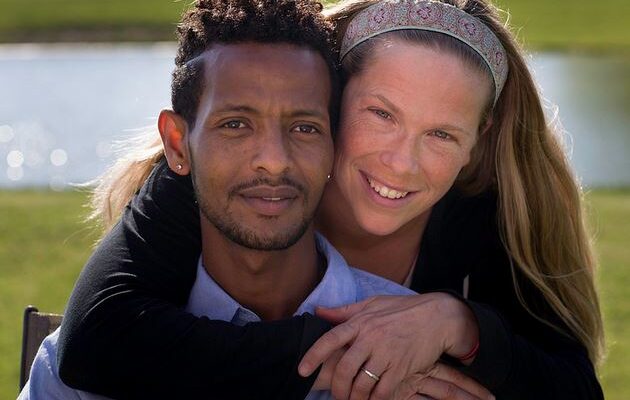Last Updated on June 30, 2016 by cassnetwork
KOKOMO, Ind. — Leadership can be found through love.
And this is a love story.
It’s not only about Rachael Drye and Finote Asfaw’s love for each other, but also the compassion for his native Ethiopia and for the people of that eastern African country.
It’s a love that drives them to relocate across the world from Indiana, where they prepare to return home with their four young children, ready to take the lead and save lives.
“Everything we do prepares us to go back and be a blessing,” said Rachael, B.S.N. ’10. “Our goal is to raise our children and grow old in Ethiopia.”
It’s an unlikely story, as they grew up on opposite sides of the world. Rachael was born and raised in Indiana, first in Winona Lake, then Logansport, and started college with plans to be a personal trainer. However, she couldn’t ignore a heartfelt call to go out into the world to serve people.
She took a leap of faith, accepting an offer to teach English to elementary school children in Ethiopia, more than 7,500 miles from home and family. After she arrived, she quickly fell in love with the country, and its warm and welcoming people. In particular, she fell in love with fellow teacher Finote Asfaw, B.S.N. ’10, who grew up in Ethiopia’s capitol, Addis Ababa.
A friendship that began over a game of soccer there led to marriage before Rachael was due to return to Indiana.
Finding their mission
A life-changing visit to Mother Theresa’s hospital in Addis Ababa inspired the mission that would drive their futures.
“I was quickly overwhelmed with the amount of need, and my overwhelming sense of inadequacy,” she said. “I was paralyzed by the moaning and groaning that were the constant background noise. I couldn’t speak the language to comfort, give medicine to relieve their pain, or know how to stop the diseases that were wreaking havoc on their minds and bodies. I remember feeling disillusioned by the smells, sounds, and sights I was witnessing.”
Finote needed no wake up call to the health care needs of his country, knowing that lack of providers meant illnesses like pneumonia and diarrhea, easily treatable in the U.S., can be deadly in Ethiopia.
“I was raised there, so I know what it’s like,” he said. “I was one of the fortunate ones who had the opportunity to come to America, where health care is available to all. I lived in Ethiopia for more than 20 years and I only remember seeing a doctor twice, not because I was healthy, but because there weren’t any available.”
As they prepared for their move to Indiana, they decided it would have a purpose — they would both become nurse practitioners, and then return to Ethiopia for good, to open clinics to bring health care to this underserved population.
The first step in that plan was enrolling in Indiana University Kokomo’s School of Nursing, where both earned their Bachelor of Science in Nursing.
“We can save people’s lives,” said Finote. “There are a lot of people dying from diseases, or from malnutrition, things we don’t think are a big deal here. There, people die from it. There are a lot of health problems in Ethiopia that can be easily prevented if people have access to good health care.”
As a result, they founded a not-for-profit organization, WeCareEthiopia, to raise money to found a health care clinic in Addis Ababa, three years from now. Later, they will open additional clinics throughout the country, making health care more readily accessible to people in rural parts of the country.
“We realized that what was needed most was health-care related,” Finote said. “We felt like nursing degrees would be the first steps to launching the goal we had in mind.”
The need is critical
Ethiopia averages just 0.7 health care workers for every 1,000 people, according to the World Health Organization. They recommend more than four times that amount, 2.3 workers to 1,000 people.
Eighty-five percent of Ethiopians live in rural areas, and must walk 20 miles or more to seek basic health care. Once they arrive, they wait hours, or even days, to be seen, because of critical lack of providers. Lack of access to clean water and sanitation also contributes to medical issues, with diarrheal disease being one of the leading causes of death among children younger than 5. Lower respiratory infections and HIV/AIDS are top causes of death in this country as well — all conditions preventable or treatable with basic medical care.
Most Ethiopians are farmers and herders, so crop failures and famine caused by deforestation, drought, and soil degradation have led millions to face starvation. Add to that, the average income is less than $1 per day, and more than a third of Ethiopia’s people live in poverty.
While Finote is motivated by personal experience, Rachael’s drive comes from being a mother of four and concern about the health care of women and their children. And the statistics are dire. The country has one of the world’s highest maternal mortality rates, averaging 675 deaths per 100,000 live births. The infant mortality rate is 59 deaths per 1,000, while the overall under-five mortality rate is 88 per 1,000 live births.
“When I think of the children, when I think of the women, they keep driving me,” she said. “There are women back home in Ethiopia who are in desperate need of someone who can provide these services for them.”
Preparing for their futures
It’s been a long journey for their family, which includes Malachi, Zipporah, and Nehemiah, born before Rachael and Finote finished their undergraduate degrees, and Gideon, who arrived during their graduate program.
Rachael applied credits previously earned to an Associate of Science in Nursing, then enrolled in IU Kokomo’s R.N. to B.S.N. program, completing her degree in August 2010. Finote chose the traditional B.S.N. program, graduating in December 2010. Both enrolled in a nurse practitioner program, and completed their professional degrees in 2014.
He specializes in adult and geriatric patients, while she focuses on women, infants, and children. She’s currently enrolled in a nurse midwife program, which she calls the final piece needed to offer a “one-stop shop” when they return to Ethiopia. He’s considering earning a Doctor of Nursing Practice (D.N.P.), as well, to prepare him for the business and management side of their clinic.
The road hasn’t been easy for the couple, who both worked full time while earning their degrees, relying on family to help with the children. Their family has made sacrifices, living in a small home in Whitestown, just north of Indianapolis, to save money for their clinic.
Finote and Rachael juggle busy schedules, with Malachi and Zipporah in school and activities, and Nehemiah and Gideon in child care. They’ve both been full-time students at the same time – with studying, classes, and required clinicals – on top of full-time jobs.
Currently, Finote is a health care provider in one of Indiana’s state prisons and Rachael is in charge of in-school health clinic at one of the Indianapolis Public Schools, serving as the primary health care provider for more than 600 elementary children.
Leadership and courage in action
A soft-spoken man, Finote is a leader not by choice, but by necessity.
“I think what you want to do brings out your leadership skills if you have strong passion for it,” he said. “We have first-hand experience in this situation, and I still have family living there. Those who believe someone else will do something probably haven’t seen it or lived it. Actually experiencing that situation is the biggest motivator for me. What we are doing will save lives.”
Their faith also compels them to take action.
“For me, it’s recognizing how much we’ve been given and knowing you’re going to give an account for what you did with your life,” Finote said. “What would my excuse be for seeing suffering and not doing something about it? There’s a soberness in realizing what you’ve been given.”
Rachael admires Finote’s resolve and his courage in leaving his home to make lives better.
“He has traded a lot to come here, to earn the education he needs to go home and help his people,” she said. “He gave up his country, his family, his language, his food, his culture. The amount of pressure he’s under and the strength he has to be a dad to four kids while working full time and going to school full time is phenomenal. He’s inspired me to be better in my life.”
To her, that is leadership.
“The biggest characteristic of a leader to me is courage, and not being afraid to fail,” she said. “It’s not like people who lead don’t have fear, we just have fear and do it anyway.”
How to help
They’re currently raising money for the first clinic, and accepting donations of supplies as well. They plan to offer health care on a sliding scale basis, or free to those who cannot afford to pay.
For more information go to wecareethiopia.org.
SOURCE: News release from Indiana University Kokomo






